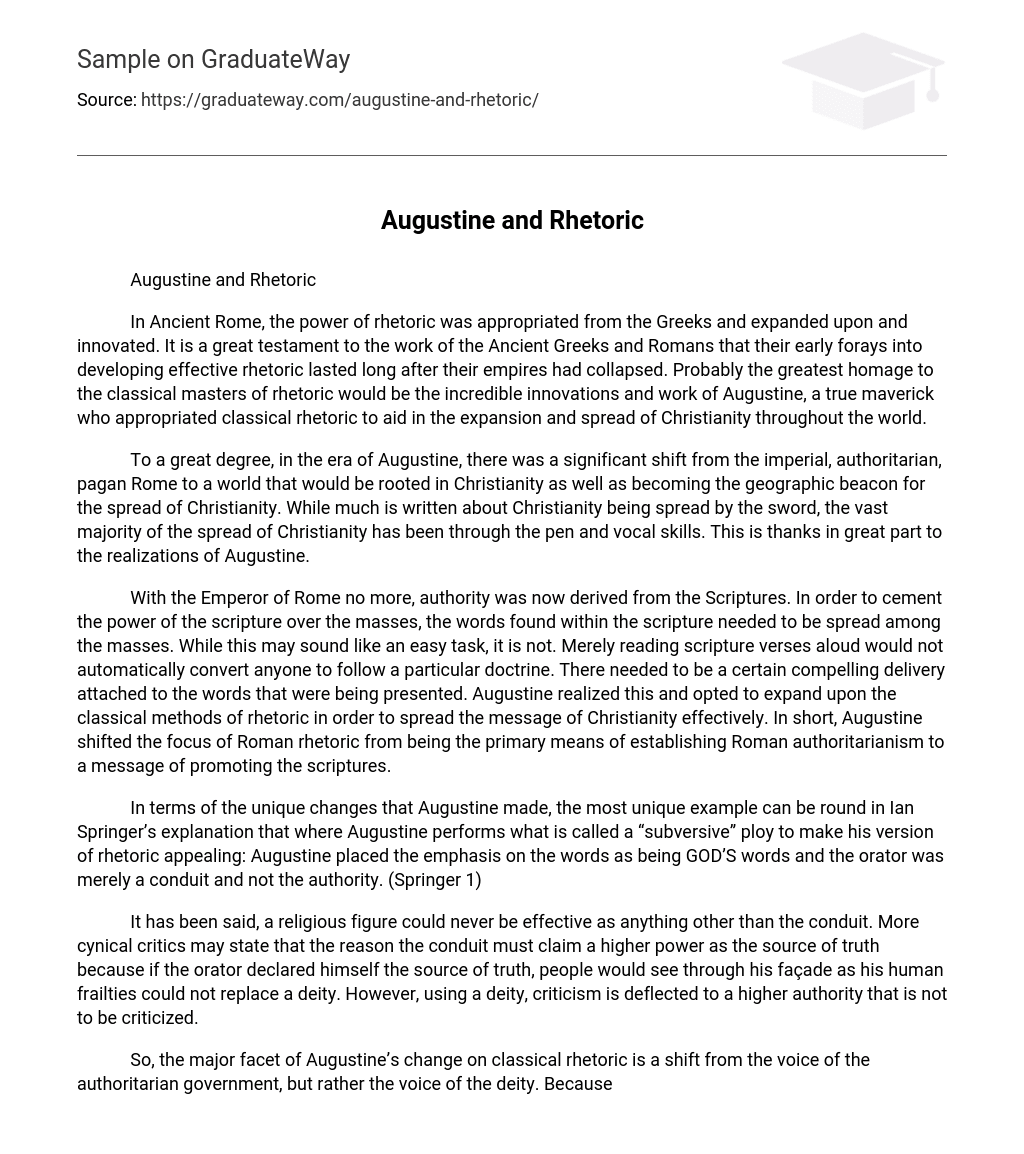In Ancient Rome, the power of rhetoric was appropriated from the Greeks and expanded upon and innovated. It is a great testament to the work of the Ancient Greeks and Romans that their early forays into developing effective rhetoric lasted long after their empires had collapsed. Probably the greatest homage to the classical masters of rhetoric would be the incredible innovations and work of Augustine, a true maverick who appropriated classical rhetoric to aid in the expansion and spread of Christianity throughout the world.
To a great degree, in the era of Augustine, there was a significant shift from the imperial, authoritarian, pagan Rome to a world that would be rooted in Christianity as well as becoming the geographic beacon for the spread of Christianity. While much is written about Christianity being spread by the sword, the vast majority of the spread of Christianity has been through the pen and vocal skills. This is thanks in great part to the realizations of Augustine.
With the Emperor of Rome no more, authority was now derived from the Scriptures. In order to cement the power of the scripture over the masses, the words found within the scripture needed to be spread among the masses. While this may sound like an easy task, it is not. Merely reading scripture verses aloud would not automatically convert anyone to follow a particular doctrine. There needed to be a certain compelling delivery attached to the words that were being presented. Augustine realized this and opted to expand upon the classical methods of rhetoric in order to spread the message of Christianity effectively. In short, Augustine shifted the focus of Roman rhetoric from being the primary means of establishing Roman authoritarianism to a message of promoting the scriptures.
In terms of the unique changes that Augustine made, the most unique example can be round in Ian Springer’s explanation that where Augustine performs what is called a “subversive” ploy to make his version of rhetoric appealing: Augustine placed the emphasis on the words as being GOD’S words and the orator was merely a conduit and not the authority. (Springer 1)
It has been said, a religious figure could never be effective as anything other than the conduit. More cynical critics may state that the reason the conduit must claim a higher power as the source of truth because if the orator declared himself the source of truth, people would see through his façade as his human frailties could not replace a deity. However, using a deity, criticism is deflected to a higher authority that is not to be criticized.
So, the major facet of Augustine’s change on classical rhetoric is a shift from the voice of the authoritarian government, but rather the voice of the deity. Because Augustine so connected Rome with the scripture, he was able to appeal to people’s connection with their religious faith. This allowed rhetoric to reach a new phase in the means and methods of persuasion and further expanded the reach of the new tome which was a Rome where the church and its infrastructure have replaced the authoritarian form of secular government control. (Springer 2)
Is this form of rhetoric unethical? In a word: no. The reason for this is that Christians already placed their allegiance to the church above the secular government rule. Augustine’s rhetoric simply followed along with what his audience really wanted to hear.
Bibliography
- Kissel, Adam. (2001) “Agustine – Under Christian Doctrine.” Retrieved April 16, 2007 from http://home.uchicago.edu/~ahkissel/rhetoric/augustine.html
- Springer, Ian. (2001) “Rhetoric Under Authoritarian Rule.” Retrieved April 17, 2007 From http://my.voyager.net/~itspring/Rhetoric.htm





